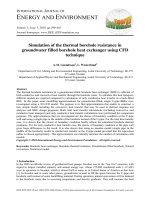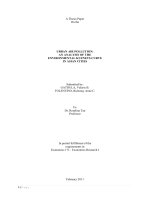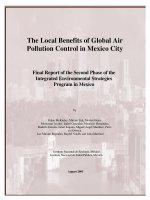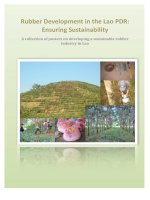Features of the Lao pillar house in French quarter in Savannakhet city of Lao PDR
Bạn đang xem bản rút gọn của tài liệu. Xem và tải ngay bản đầy đủ của tài liệu tại đây (784.43 KB, 5 trang )
KHOA H“C & C«NG NGHª
Features of the Lao pillar house in French quarter in
Savannakhet city of Lao PDR
Đặc điểm của nhà sàn Lào trong kiến trúc khu phố Pháp ở thành phố Savannakhet, CHDCND Lào
Khamphouphet Vanivong
Tóm tắt
Bài báo này đề cập tới các đặc điểm của kiến trúc nhà sàn Lào trong khu
phố thuộc địa Pháp tại thành phố Savannakhet trong thời kỳ giao thoa
văn hóa kiến trúc thuộc địa Pháp với kiến trúc truyền thống Đông Dương
và Lào. Mọi hoạt động được diễn ra trong thời kỳ Pháp chiếm đóng Lào
(1900-1954). Trong thời kỳ này, có nhiều công trình kiến trúc thuộc địa
Pháp được xây dựng và phát triển theo nhiều kiểu cách khác nhau, từ bắt
chước các công trình kiến trúc gốc ở Pháp cho tới sự chuyển hóa về kiến
trúc để thỏa mãn tính chất địa phương của khu vực này. Những đặc điểm
của kiến trúc thuộc địa Pháp trong khu phố Pháp ở Savannakhet chủ yếu
tập chung vào chức năng sử dụng. Hình dáng kiến trúc và vật liệu xây
dựng được sử dụng để thỏa mãn các hoạt động sống, xã hội, văn hóa
cũng như điều kiện tự nhiên (ví dụ như khí hậu nóng ẩm của vùng nhiệt
đới…) và chúng là những tác nhân chính trong việc xác định các đặc
điểm kiến trúc của khu phố Pháp ở thành phố Savannakhet.
Từ khóa: đặc điểm, kiến trúc thuộc địa Pháp, nhà sàn Lào, Savannakhet
Abstract
The paper refers to the architectural features of the Lao pillar house
in the French colonial quarter in Savannakhet city during the cultural
interfering process of the French colonial’s architecture in the Indochina
and Lao traditional architecture. All activities have been carried out
in the French domination in Laos (1900 - 1954). During this time,
there had been many French colonial’s architectural works which were
organized and developed into many different kinds, from the copy of
architecture origins in France to the architectural conversion to satisfy
the locality in the area. The features of French colonial’s architecture
in the French quarter of Savannakhet city was mainly focused in the
function. Architectural form and building materials was used to meet
the social, cultural, living activities and natural conditions (such as hot
and humid climate of the tropical region…) and these were the main
factors determining the architectural features in the French quarter of
Savannakhet city.
Key words: Features, French colonial’s architecture, Lao pillar house,
Savannakhet
Khamphouphet VANIVONG
PhD student, Ha Noi Architectural University
Email:
Ngày nhận bài: 15/3/2018
Ngày sửa bài: 10/4/2018
Ngày duyệt đăng: 05/10/2018
8
1. An overview of the origin and growth of urban
architecture in the French Quarter’s of Savannakhet
French colonial architecture is one of the cultural heritages
of French colonial period, was born and grew in the Indochina.
By the 20th century, the architecture of this new era was most
diverse, with the aim of serving the nobility of France and
Laos. Many architectural buildings were directly influenced by
French cultural architecture, as these represent the power and
oppression of them in the French colonial countries. However, in
the future, many French-style buildings have been integrated with
local cultural and architectural styles to find the environment and
climate of the Indo-China region.
Savannakhet is one of the areas under French colonial rule of
southern Laos, where the area is affected by the humid tropical
climate of the summertime, which is short and long since the early
summer. Since then, the area has been chosen by the French as
the center of southern Laos, followed by the temporary capital of
Laos from 1895 to 1900. So, at this time many buildings in French
architecture were built here and continued to grow in the French
colonial period until 1954, ending. Then the architecture of the
city became into a modern style by modern architecture, while
the French colonial architecture was slowly forgotten as an image
of memory in the history of French colonial era in the early 20th
century.
The diversity of French colonial architecture in the French
quarter’s of Savannakhet, was clearly demonstrated in the period
from 1910 to 1930, and became a monument of the locals and
others found. At the same time, most of the buildings built in Laos
are built in the style of French colonial architecture in other places
that have not been built before. It is not newly designed but many
architectural built here were according to French architectural
prototypeand never mind the condition into the real environment.
So, in order to suit the environment, culture, society and economy,
local architecture and French are gradually find the appropriate
conditions actually said also to meet the physical and mental
Many live in Laos, because the architecture of the French colonial
later not only French only use but there are also Lao people prefer
and use many more.
Nowadays, with times and events changed, many French-style
colonial buildings have disappeared and are likely to be forgotten
because they cannot be retained in an original architectural form.
Thus, research and understanding about the French colonial’s
Architecture in the French Quarter’s of Savannakhet is the most
importance and urgency to be a historical study and contribute to
the development of cultural tourism in the old town.At the same
time, as well as economic development, the rapid growth of
rapidly growing cities and the process of urbanization is a major
challenge to the research and survival of the heritage that is
sensitive to the current society.
2. French colonial Architecture in the French Quarter’s of
Lao
After a time of rule in Lao, French colonial’s urban style or
the French quarter were built in the many area of Laos such
T„P CHŠ KHOA H“C KI¦N TR”C - XŸY D¼NG
Figure 1. Map of the French Quarter’sof Savannakhet
Figure 2. French colonial architecture style in the other French Quarter’s of Lao
(Thakhaek, Champasack and Luangprabang)
as: Luangprabang, Vientiane,Thakhek, Savannakhet and
Champasak. Those French quarter were formed which have
different sizes and importance, the Architecture were also
diverse in different area because each metropolitan area was
different significance for the purpose of the French colonial
administration’s management plan for example: Vientiane
was a capital of Lao has a lot of administrative and public
buildings, Luangprabang was old capital and the king’s
Lao were lived there, so it was royal palace and beautiful
residential building, for other city in the local consisted of the
small buildings including Single house, row house, adjacent
house… But when look at the overview, several building of
the French colonial’ architecture in the French quarter’s of
Lao era has the same conformation about style, form and
structure.
French colonial’s architecture, in primary was indicated
as novel product and high price, because only French people
and some of minor aristocracies, noblemans, officials and
the rich merchants could be the owner and could live in that.
So for the general people still lived in Lao pillar house, but
after that the French colonial’s architecture were popularity
and widespread, Lao people had copied type and applied it
to other architectural building such as: Villa house, Primary
school, Post office, Hospital…Then the French colonial’s
architecture has gradually transformed into form and
function, because of the cultural influence responded to life
living, custom, tradition and climate in the tropical region of
Lao. Particularly in the French colonial’s architecture as the
Lao pillar house.
3. Characteristics of the French colonial architecture in
Savannakhet
French quarter’s Savannakhetor the Old city (UA_a)
cover an area of about 55.41 ha, consisting of the six villages
adjoining the Mekong River Bank, Nowadays, the old city
has 95 remaining French colonial architecture, Most of these
buildings are well-conditioned and well-function-intensive Or
adjusted to a new function that are compatible with modern
era, the architecture of these architectural structures can be
distinguished into three style of architecture:
- Neo_Gothic Style
- French local style
- Indochina Style
Most French architecture in the old city of Savannakhet
was built in the 1920s that was a time when French
colonial architecture rapidly expanded and varied in form,
style and size, this diversity is partly because French
colonial architecture has been integrated well with the local
culture architecture become an architectural model that is
interesting, unique and feature in contrast to the other French
architectural styles that have been built in the Indochinese
Peninsula such as: French colonial architecture of The Lao
Pillar House
4. The Features of French colonial architecture of the
Lao Pillar House in the French Quarter’s of Savannakhet
The Features of French colonial architecture in the French
Quarter’s that the easiest to observe is the style of housing
architecture, because the architectural style is similar to the
Lao Pillar house, it has a good point about the suite using
to the best local environment. There is also an area of use
within the building suitable for Lao living and culture. At
the same time, the architecture is also integrated with the
dominant features of the French colonial architecture, which
is a Solid Structure and modern construction materials of
that era. About French colonial architecture style in the old
city, besides Lao style. But there are many styles such as:
S¬ 32 - 2018
9
KHOA H“C & C«NG NGHª
Figure 3. French colonial architecture style in the French Quarter’s of Savannakhet
Figure 4. Architectural model in Lao style
Adjacent house, Single house, Villa house, Detached house
and Rowhouse … which the building has been acquired from
Vietnamese and Chinese.
security of work durability, modern form, modern materials
suitable for culture and actual environment. The overall
features of the French colonial architecture are:
4.2.1. Architecture Form
4.1. French colonial’s Architecture of the Lao pillar house
The Lao Pillar house is one of the Lao architectural
forms with the common construction of the Lao people
that including: Scale and many form by depending on the
actual situation in Laos But generally, it is popular to build
a Pillar House. The overall features of the Lao-style home
architecture are often made of wood, with two floors is the
first floor attached to the ground is open space can see the
pillar system from ground to floor about (1 – 3) meters, the
second layer is made of lumber, which is connected to the
ladder stairs, but sliding wall is Lumber Wall or Tocxi Wall
by this area has been divided into three sections are private
areas (bedrooms + venerator room), open space (guesting,
eating, resting ...) and kitchen areas that are usually lowered
to the floor area of about (10-20) cm include cooking places,
fireplaces, dishwashers, water jar, etc. there will be another
ladder stairs. Ropes often have a slope of 30° - 40°, there
are both Gable roof, Hipped roof, Haft roof, and Tudor which
Roofed with natural materials such as: clayroof, terracotta
sheet, Wooden planks and Grass roof.
4.2. The Converting of French colonial architecture style
transformed into a model of Lao style architecture
After several years of French colonial architecture and
development in the old city of Savannakhet, many feel that
these architectural structures are far too indistinguishable to
the specificities of local climate and culture. Until the 1920s
French colonial architecture flourished and the Lao people
became interested in building their own self-esteem building,
which has become popular amongst the people of that era, but
the French colonial architecture itself has not been adapted
to the actual use of the Lao people. So, has appeared of a
new French colonial architecture, known as the Laos style’s
French colonial architecture, which later became a model for
the construction of a French colonial architecture building in
Laos that could meet the needs of Lao people. Ensuring the
10
Overall, the architecture is shaped like a Lao or Lao style
architecture, with a light shape not solid shape like a Frenchstyle building with two floors:
- The first floor is a pillar system with open ground floor
area, used for storage of appliances, vehicles, pet, charcoal,
fuel, etc. with a pillar of (40x40) cm (60x60) cm (60x60) cm
made with bricks, with a height of pillar and a floor area of
1.5metres - 2meters.
- The second floor: Connected to the bowl on the side or
the front of the building, consisting of open space for dining,
resting. The closed area is the bedroom, and there is also a
kitchen area and a pond that is connected to the side of the
building for cooking. For open space, it is often popular to
block a long line along the length of the building.
4.2.2. Material and decoration details
Most of the architecture often uses local materials, but the
core structures also need to use external materials to secure
the building such as: Cement, steel. Most of the local materials
will be natural materials that are found and produced in the
areasuch as: lumber, tile, brick, sand, stone…The material is
suitable for the condition of the humid tropics, and the price
is not too high for the Lao economy at that time. For each
section of the building, use the following materials:
- Column: Made of bricks, used to gain weight from
the floor by each pillar, will have a section size, height and
amount depending on the type of house.
- Floor: made of lumber with width from (20 – 40)cm Most
materials are produced locally which may be of wood species
based on price and quality for the wood to be aligned in a row
along the length of the floor to a level just good, but the height
of the floor may vary as the area bedroom building may be
higher than the floor of the hall and Kitchen room usually be
lower than the floor of the house constantly.
T„P CHŠ KHOA H“C KI¦N TR”C - XŸY D¼NG
Figure 5. Many styles of the French colonial’s architecture in Lao house style
Figure 6. A detailed section of French colonial’s architecture of the Lao pillar house
Figure 7. Frame structure system of French colonial’s Architecture of the Lao pillar house
- Wall: The building not made of brick like the architecture
of French style but popular wood (lumber) or not, with TocXi
wall, the wall mixed with lime mixed with cow dung or buffalo
dung and waved down a bamboo wall, such as lightweight
and well ventilated material, can produce the size required
and easily installed with a high resolution beautiful, durability
and resistance to insects as well.
- Roof: As an important part of sun and rain protection, the
roof of the building usually has a horizontal roof approximately
30° - 40°. Most of the roofing material is tile, lumber piece of
about (15 cm – 30)cm.
4.2.3. Building Structure
The French colonial’s architecture of Lao pillar House is a
building designed to build a Frame Structure. This structural
system is used in such large buildings because it has a lighter
than the wall structure of the French structure, the weighing
structure is weighted into the pole, for walls with only the
front cover for sunbathing, with a thickness of 10cm - 13cm,
the bottom with the upper part will have a different size, with
the bottom of the pillar, with a size of (40x40x60x60) cm, the
upper pillar is often made of wood or bricks with a size of
(20x20 - 25x25) cm.
5. Conclusion
At present, the culture heritage of French colonial’s
Architecture of the Lao pillar house in the old city of
Savannakhet is still very less compared to other French
colonial’s architecture, mostly are bricks, which may be more
stable than wooden structures, this may be one reason that
the French colonial’s architecture of the Lao pillar house has
deteriorated rapidly over a period of time. Therefore, in order
to preserve the architecture as part of Lao cultural heritage,
it is necessary to be regularly restored and to replace the
material when it is damaged to maintain the condition of the
building, at the same time, proper use of the building must
be maintained by maintaining the oldest use function or
contributing to the driving through the use of the new building,
but maintaining its original condition so that the building is not
abandoned and lively. From the current survey of the French
colonial architecture buildings of Lao pillar house in the old city
of Savannakhet, there are 5 of them, of which three are still in
use, the other two buildings have been rebuilt and replaced
with the use of new ones, one is a police office,another one is
the exhibition space and information center.
Therefore, education and heritage conservation of
S¬ 32 - 2018
11
KHOA H“C & C«NG NGHª
French colonial’s architecture should be promoted and what
is urgently needed now to protect the heritage and values art
architecture is not lost and the youth studied the evidence of
history and also promote culture tourism in the old city with
the French colonial’s architecture heritage to be center and
attract tourists./.
4. Le Minh Son. (2013). Indochina Architecture : Construction
Printing House.
T¿i lièu tham khÀo
1. Science research project. (1997). Research and Study Old
building of French Colonial’s Architecture in the old city of
Savannakhet Project. Faculty of Architecture, University of Lao
5. Nguyen Dinh Toan. (1997).The natural and cultural original
factors at local on French colonial’s architecture in Vietnam.
University of Architecture, Ha Noi.
2. Ministry of Education and Sport. (2002).The history of Lao in the
period colonial from1893-1954.
6. Ton Dai. (2009). French colonial’s architecture heritage, values
and effects. Architectural Magazine Journal
3. Atetier du Pratimoine IRU- IPRAUS, Projet d’ Inventaireet d’
Etude du Pratimoine Architectural, Urbain&Paysager de la ville
de Vientiane, 1999 - 2002.
7. International Cultural Research Institute. (2006). Architecture
in the Old Town of Hoi An. University of NuChieuHoa: The Gioi
Printing House.
Officetel – Thực trạng nhu cầu...
(Tiếp theo trang 6)
sau 50 năm của tài sản Office-tel sẽ ra sao thì chưa ai biết cả.
Vì vậy việc mua bán loại hình sản phẩm này có nhiều
nguy cơ xảy ra tranh chấp giữa chủ đầu tư và người mua.
Chủ đầu tư sẽ gặp một số trở ngại pháp lý khi triển khai các
dự án, thủ tục xin chuyển đổi công năng hay mục tiêu của dự
án. Bên cạnh đó, một loạt vấn đề như: Cấp phép phòng cháy
chữa cháy, an ninh trật tự, tạm trú, bãi đậu xe, dịch vụ viễn
thông, vận hành phí, xác định phần diện tích sở hữu chung…
cũng cần phải được đặt ra để giải quyết sao cho không trái
luật nhưng vẫn bảo đảm lợi ích của nhà đầu tư, quyền lợi
hợp pháp khách hàng mua Officetel.
●● Để doanh nghiệp có cơ hội tiếp cận với officetel hợp pháp
Giai đoạn vừa qua, khi không được kinh doanh trong
chung cư thì các doanh nghiệp phải chuyển sang lựa chọn
Officetel. Nếu Officetel cũng không được tạo điều kiện phát
triển, trong khi giá thuê văn phòng cao, các công ty siêu nhỏ
buộc vẫn phải thuê các văn phòng trong chung cư sẽ gây
ra sự lẫn lộn, không minh bạch và hiệu lực của pháp luật sẽ
không cao.
2.7. Một số dự án căn hộ Officetel ở Hà Nội và thành phố Hồ
Chí Minh
●● Dự án Sunshine centrer 16 Phạm Hùng
Điểm nổi bật của Sunshine Center là khu căn hộ văn
phòng Officetel được bố trí từ tầng 5 đến tầng 12 của tòa
nhà.
●● Jamona Golden Silk Officetel - Quận 7, thành phố Hồ Chí
Minh
Jamona Golden Silk, mỗi căn Officetel có diện tích từ 33
– 45m2, được thiết kế thông minh, hài hoà, vừa đảm bảo
mang lại một môi trường làm việc hiện đại, vừa đạt chuẩn
của một căn hộ tiện nghi. Officetel được bố trí đầy đủ phòng
làm việc, phòng tiếp khách, phòng nghỉ ngơi, phòng bếp và
nhà vệ sinh.
Ưu điểm của các dự án này là Offficetel được bố trí độc
lập với Jamona Golden Silk Officetel được bố trí tầng 3, 4
của tòa nhà, Sunshine centrer 16 Phạm Hùng bố trí từ tầng
5 đến tầng 12 tương đương với nhiều loại diện tích khác
nhau, các tầng độc lập không nằm xen kẽ với những căn
hộ sẽ có nhiều lợi thế, được hưởng mọi tiện ích tại khu dự
án như Spa, Gym, trung tâm thương mại, siêu thị tiện ích…
Dự án Sài Gòn Mia thiết kế 4 tầng thương mại kết hợp với
Officetel cũng có ưu điểm thang sảnh tầng công cộng, văn
phòng Officetel không làm ảnh hưởng đến giao thông và
sảnh của khối căn hộ. Sky center quận Tân Bình, Thành phố
Hồ Chí Minh gồm 4 block cao 16 tầng (1 tầng hầm gửi xe, 1
tầng hầm thương mại) với 3 block căn hộ và 1 block Officetel
(Block A). Khi officetel nằm ở 1 đơn nguyên độc lập sẽ dễ
quản lý, an toàn an ninh cho các căn hộ ở của dự án.
3. Kết luận
Trong bối cảnh hội nhập kinh tế thế giới, nền kinh tế Việt
Nam đã và đang trong quá trình đổi mới với sự xuất hiện của
các doanh nghiệp vừa và nhỏ ngày càng tăng, dẫn đến thị
trường văn phòng cho thuê đối với các doanh nghiệp vừa và
nhỏ trở cũng nên nóng hơn bao giờ hết. Trước tình hình đó
mô hình căn hộ Officetel cũng được du nhập vào trong nước
và Officetel Việt Nam là thị trường mới nên tiềm năng phát
triển vừa đáp ứng nhu cầu ngủ nghỉ sinh hoạt vừa đáp ứng
nhu cầu làm việc mà giá cả hợp lý nên lợi ích đầu tư Officetel
cũng lớn. Tuy nhiên bên cạnh những cơ hội thì Officetel cũng
còn nhiều những thử thách, những mâu thuẫn mà cần phải
khắc phục:
- Officetel chỉ được sở hữu 50 năm trên đất sử dụng lâu
dài.
- Officetel không có chức năng cư trú nhưng không thể
cấm ở.
Nhận xét:
Một số dự án đã quan tâm đến nhu cầu thị trường và
đưa ra mô hình thiết kế chung cư kết hợp với Officetel như
dự án Sunshine Centrer - 16 Phạm Hùng - Hà nội,dự án Sài
gòn Mia - quận Bình Chánh, Thành phố Hồ Chí Minh, dự án
Jamona Golden Silk Officetel - Quận 7, thành phố Hồ Chí
Minh, dự án Sky Center - quậnTân Bình, Thành phố Hồ Chí
Minh...
12
T„P CHŠ KHOA H“C KI¦N TR”C - XŸY D¼NG
- Officetel tiềm ẩn nguy cơ quá tải hạ tầng.
- Officetel là sản phẩm tự phát, chưa có quy chuẩn riêng./.
T¿i lièu tham khÀo
1. Giáo trình bất động sản –TS. Nguyễn Minh Hoàng, Nhà xuất
bản tài chính – 2015
2. Giáo trình kinh tế đầu tư – TS. Từ Quang Phương, Nhà xuất
bản đại học kinh tế quốc dân - 2013.









